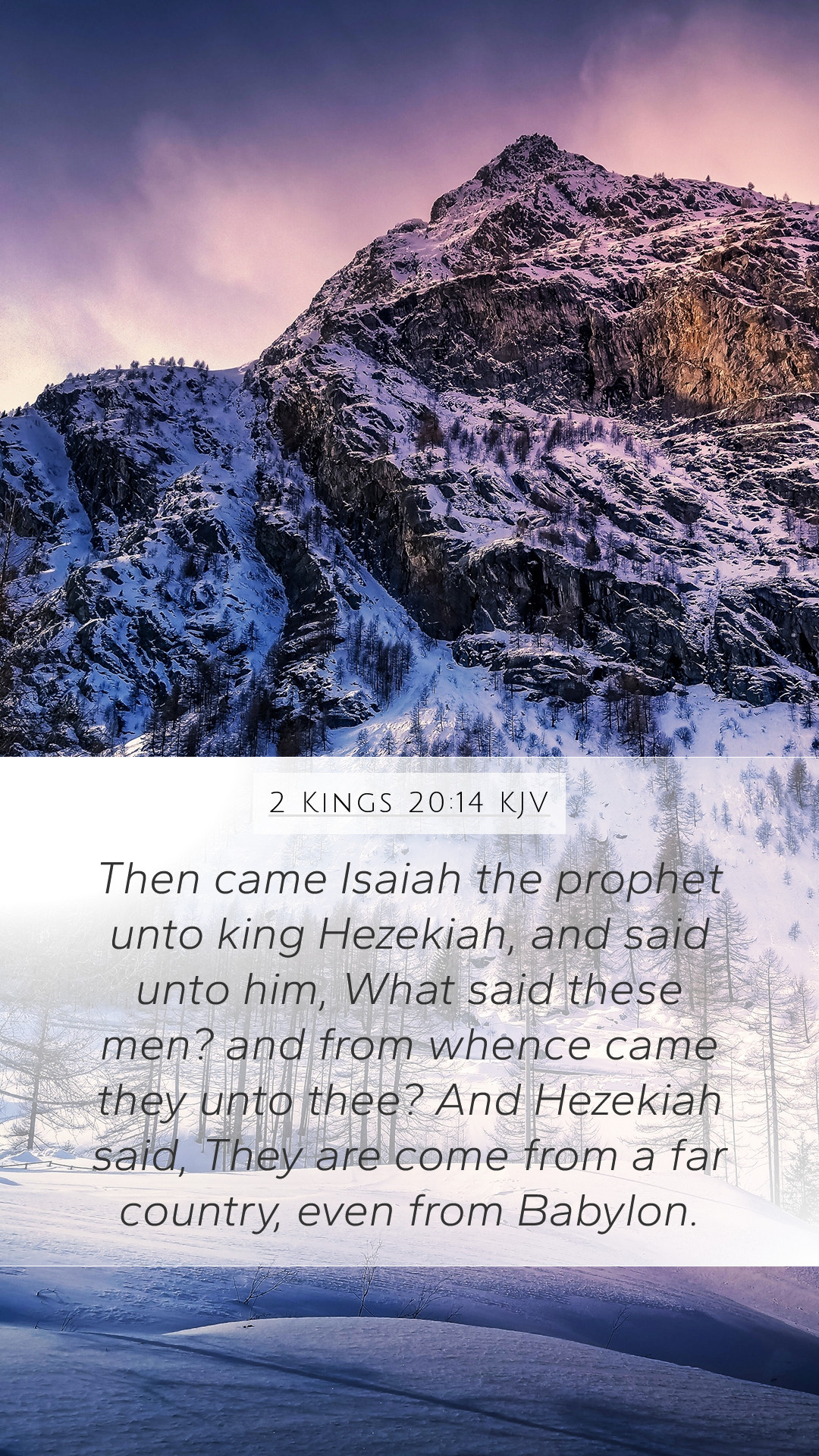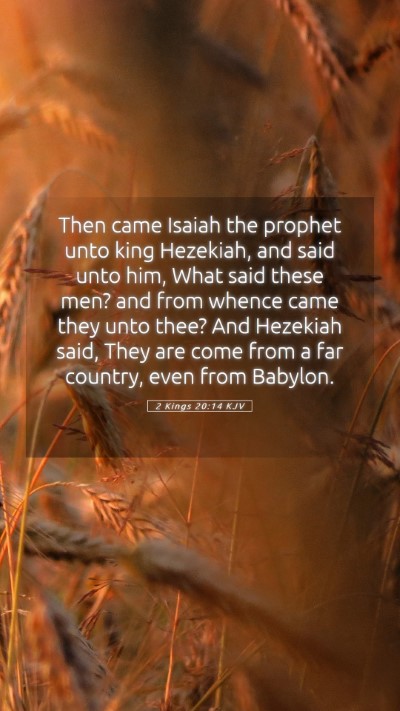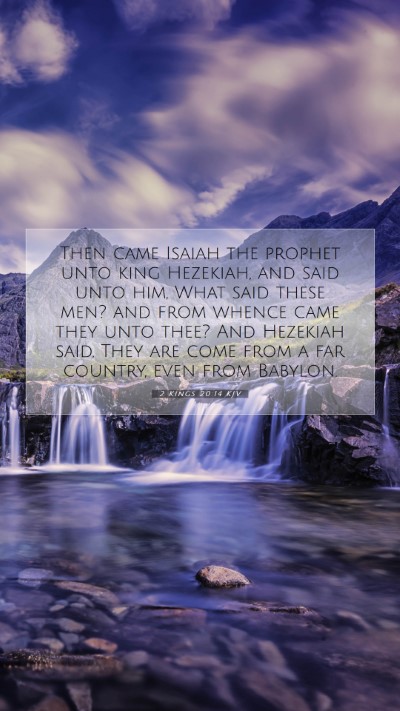Old Testament
Genesis Exodus Leviticus Numbers Deuteronomy Joshua Judges Ruth 1 Samuel 2 Samuel 1 Kings 2 Kings 1 Chronicles 2 Chronicles Ezra Nehemiah Esther Job Psalms Proverbs Ecclesiastes Song of Solomon Isaiah Jeremiah Lamentations Ezekiel Daniel Hosea Joel Amos Obadiah Jonah Micah Nahum Habakkuk Zephaniah Haggai Zechariah Malachi2 Kings 20:14 Meaning
What is the meaning of 2 Kings 20:14?
Then came Isaiah the prophet unto king Hezekiah, and said unto him, What said these men? and from whence came they unto thee? And Hezekiah said, They are come from a far country, even from Babylon.
2 Kings 20:14 Bible Verse Meaning
Understanding 2 Kings 20:14
The verse 2 Kings 20:14 reads:
"Then came Isaiah the prophet unto King Hezekiah, and said unto him, What said these men? and from whence came they unto thee? And Hezekiah said, They are come from a far country, even from Babylon."
Summary of Bible Verse Meaning
This passage occurs in the context of King Hezekiah’s reign, where he encounters envoys from Babylon. The bending of Hezekiah towards the Babylonian visitors and the subsequent discourse with the prophet Isaiah introduces critical themes of humility, divine foresight, and the consequences of alliances.
Key Themes
- The Role of Prophecy: Isaiah's role as a prophet emphasizes the importance of divine communication. He inquires deeply about the visitors, indicating God’s interest in how His people interact with foreign nations.
- Hezekiah's Response: Hezekiah's admission that the men come from Babylon hints at his pride and inclination to boast of his kingdom. It reflects human nature to seek validation through worldly associations.
- Divine Providence: There is an underlying hint at the prophetic warning regarding future consequences due to Hezekiah’s actions, which is a common theme in scriptural analysis.
Commentary Insights
Matthew Henry's Commentary
Henry emphasizes that Hezekiah's inquiry reveals his desire to be seen as significant among nations, suggesting a dangerous allure in diplomatic relations that can distract from spiritual integrity. He points out that the questions posed are not mere curiosities but are infused with the gravity of prophetic significance.
Albert Barnes' Notes
Barnes correlates Hezekiah’s interaction with the Babylonians to a lapse in his steadfastness. He interprets the visit as an opportunity for self-aggrandizement and a test of faithfulness to God. Barnes highlights how Isaiah’s questioning leads to an important revelation about the impending demise of Judah due to these alliances, underscoring the necessity of discerning spiritual truths over temporal gains.
Adam Clarke's Commentary
Clarke provides context on the historical background, noting the geopolitical landscape. He mentions that the interaction with Babylon prefigured future events in which Babylon would become a key player in the downfall of Judah. He also notes that Hezekiah’s openness might have stemmed from a nationalist pride, which was ultimately misguided.
Historical Context
The geopolitical encounter described symbolizes a testing of Hezekiah’s allegiance to the God of Israel. Such interactions with foreign nations often illustrate spiritual crises that God's people faced. Understanding these circumstances enhances our Bible study insights, leading to deeper biblical exegesis.
Application to Daily Life
This passage can be seen as a reminder to assess where our allegiances lie. In today’s terms, the passage speaks to how we can sometimes elevate worldly relationships and successes over our walk with God.
Cross References
- Isaiah 39:1-8 - Details Hezekiah showing Babylonian envoys his treasures.
- 2 Chronicles 32:31 - Illustrates God's testing of Hezekiah's heart regarding these Babylonian visitors.
- Jeremiah 39:1-18 - Connection to the Babylonian later conquest of Jerusalem.
Conclusion
2 Kings 20:14 portrays a pivotal moment in Hezekiah's reign, blending themes of prophecy, pride, and the impending threat of Babylon. For anyone engaged in Bible study groups or seeking comprehensive Bible study resources, this scripture provides fertile ground for understanding Scripture and contemplating its application in a modern context.
Further Study
For those looking to deepen their knowledge, consider exploring the implications of this verse in terms of Old Testament prophecy interpretations. Examining the tension between political actions and spiritual fidelity is key in navigating the complexities of faith in an interconnected world.


